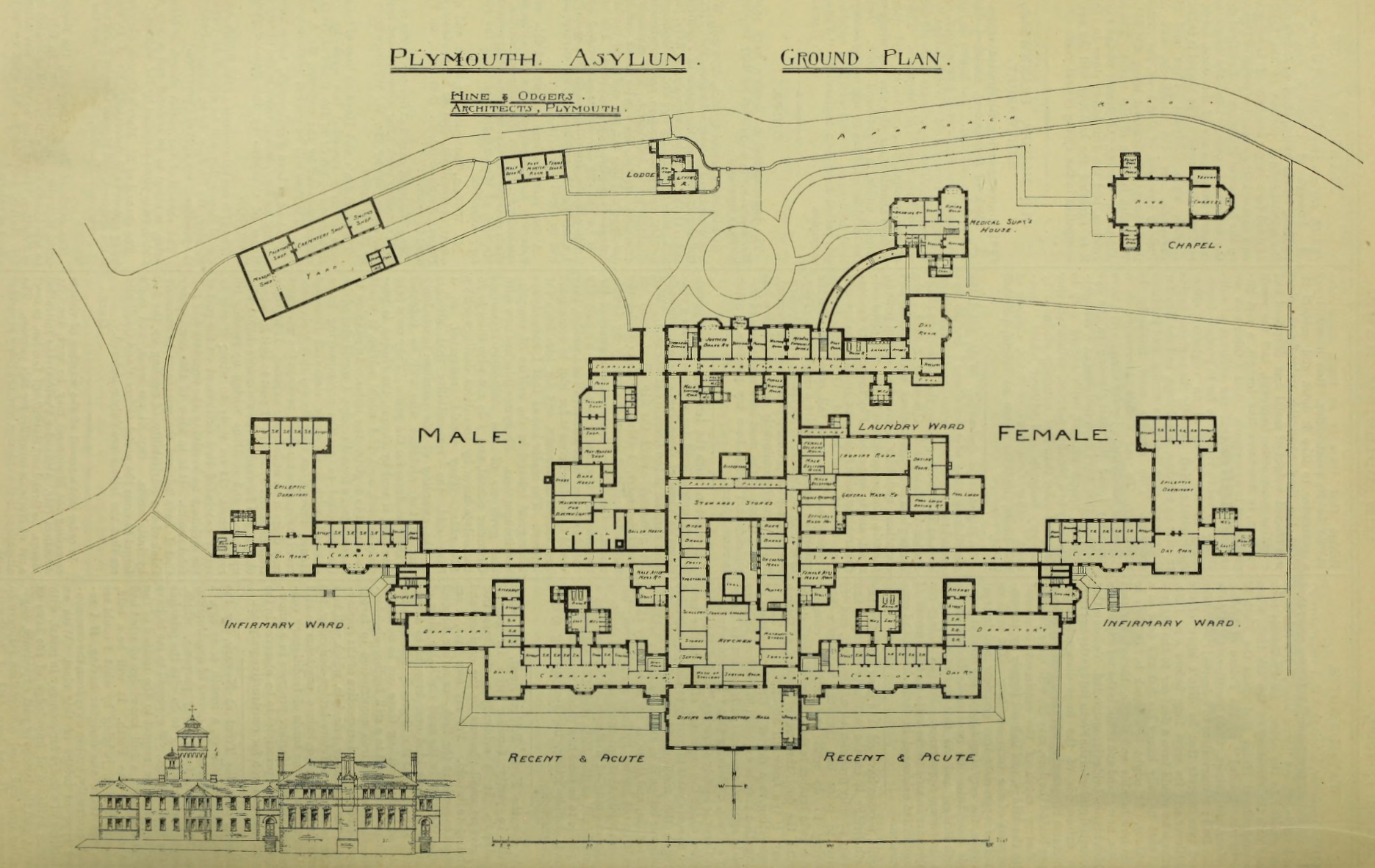Moorhaven Hospital
 Moorhaven Hospital was a psychiatric hospital located in the United Kingdom. It played a significant role in the history of psychiatric care in the region, reflecting the evolution of mental health treatment practices over the years. The hospital's history, architecture, and the transition in its use over time offer a window into the broader narrative of psychiatric care.
Moorhaven Hospital was a psychiatric hospital located in the United Kingdom. It played a significant role in the history of psychiatric care in the region, reflecting the evolution of mental health treatment practices over the years. The hospital's history, architecture, and the transition in its use over time offer a window into the broader narrative of psychiatric care.
History[edit | edit source]
Moorhaven Hospital was originally established in the late 19th century, during a period when the approach to mental health care was undergoing significant changes. The hospital was part of a broader movement away from the treatment of mentally ill individuals in prisons and workhouses towards their care in specialized institutions. This shift was driven by a growing recognition of mental illness as a medical condition requiring treatment and care in a dedicated setting.
Facilities and Treatment[edit | edit source]
The hospital was designed according to the principles of the era, which emphasized the importance of fresh air, natural light, and the therapeutic value of beautiful surroundings in the treatment of mental illness. The layout of Moorhaven Hospital typically included extensive grounds for patients to walk and relax in, as well as various buildings for accommodation, treatment, and administration. Treatment methods at Moorhaven evolved over time, reflecting broader changes in psychiatric care. Initially, treatments may have included rest, diet, and occupational therapy, with a focus on moral treatment and rehabilitation. As medical understanding of mental health conditions advanced, the hospital adapted to include more modern therapeutic and medical treatments.
Closure and Aftermath[edit | edit source]
Like many psychiatric hospitals of its age, Moorhaven Hospital eventually closed. The reasons for closure were multifaceted, including changes in mental health policy, a move towards community-based care, and the high costs of maintaining large institutional facilities. After its closure, the site of Moorhaven Hospital underwent various transformations, which may have included redevelopment for residential use, preservation as a historical site, or repurposing for other community uses.
Legacy[edit | edit source]
The legacy of Moorhaven Hospital lies in its contribution to the history of psychiatric care and its reflection of the changing attitudes towards mental health over time. The hospital's history provides insights into the evolution of psychiatric treatment methods, the impact of architectural and environmental factors on mental health care, and the shift towards more humane and effective approaches to mental illness.
Search WikiMD
Ad.Tired of being Overweight? Try W8MD's physician weight loss program.
Semaglutide (Ozempic / Wegovy and Tirzepatide (Mounjaro / Zepbound) available.
Advertise on WikiMD
|
WikiMD's Wellness Encyclopedia |
| Let Food Be Thy Medicine Medicine Thy Food - Hippocrates |
Translate this page: - East Asian
中文,
日本,
한국어,
South Asian
हिन्दी,
தமிழ்,
తెలుగు,
Urdu,
ಕನ್ನಡ,
Southeast Asian
Indonesian,
Vietnamese,
Thai,
မြန်မာဘာသာ,
বাংলা
European
español,
Deutsch,
français,
Greek,
português do Brasil,
polski,
română,
русский,
Nederlands,
norsk,
svenska,
suomi,
Italian
Middle Eastern & African
عربى,
Turkish,
Persian,
Hebrew,
Afrikaans,
isiZulu,
Kiswahili,
Other
Bulgarian,
Hungarian,
Czech,
Swedish,
മലയാളം,
मराठी,
ਪੰਜਾਬੀ,
ગુજરાતી,
Portuguese,
Ukrainian
Medical Disclaimer: WikiMD is not a substitute for professional medical advice. The information on WikiMD is provided as an information resource only, may be incorrect, outdated or misleading, and is not to be used or relied on for any diagnostic or treatment purposes. Please consult your health care provider before making any healthcare decisions or for guidance about a specific medical condition. WikiMD expressly disclaims responsibility, and shall have no liability, for any damages, loss, injury, or liability whatsoever suffered as a result of your reliance on the information contained in this site. By visiting this site you agree to the foregoing terms and conditions, which may from time to time be changed or supplemented by WikiMD. If you do not agree to the foregoing terms and conditions, you should not enter or use this site. See full disclaimer.
Credits:Most images are courtesy of Wikimedia commons, and templates Wikipedia, licensed under CC BY SA or similar.
Contributors: Prab R. Tumpati, MD
